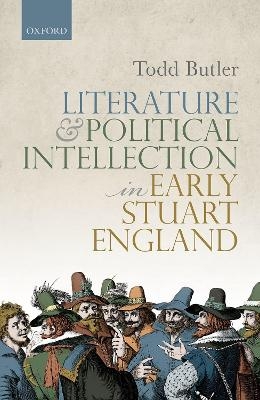
Literature and Political Intellection in Early Stuart England
Oxford University Press (Verlag)
978-0-19-884406-8 (ISBN)
Drawing upon a myriad of literary and political texts, Literature and Political Intellection in Early Stuart England charts how some of the Stuart period's major challenges to governance--the equivocation of recusant Catholics, the parsing of one's civil and religious obligations, the composition and distribution of subversive texts, and the increasing assertiveness of Parliament--evoked much greater disputes about the mental processes by which monarchs and subjects alike imagined, understood, and effected political action. Rather than emphasizing particular forms of political thought such as republicanism or absolutism, Todd Butler here investigates the more foundational question of political intellection, or the various ways that early modern individuals thought through the often uncertain political and religious environment they occupied, and how attention to such thinking in oneself or others could itself constitute a political position. Focusing on this continuing immanence of cognitive processes in the literature of the Stuart era, Butler examines how writers such as Francis Bacon, John Donne, Philip Massinger, John Milton, and other less familiar figures of the seventeenth-century evidence a shared concern with the interrelationship between mental and political behavior. These analyses are combined with similarly close readings of religious and political affairs that similarly return our attention to how early Stuart writers of all sorts understood the relationship between mental states and the forms of political engagement such as speech, oaths, debate, and letter-writing that expressed them. What results is a revised framework for early modern political subjectivity, one in which claims to liberty and sovereignty are tied not simply to what one can do but how--or even if--one can freely think.
Todd Butler is Associate Professor (English) and Associate Dean for Faculty (College of Arts and Sciences) at Washington State University, where he researches and teaches on seventeenth-century English literature, law, and political theory. Author of Imagination and Politics in Seventeenth-Century England, he has also published essays on early modern crime and witchcraft, print culture, and the connections between early modern literature and contemporary U.S. Supreme Court jurisprudence. He is a past president of the MLA Discussion Group on Law and Literature and the current president of the Association of Departments of English.
Introduction
1: Equivocation, Donne, and the Political Interior
2: The Moderation of Oath-Taking in Jacobean England
3: Composition, Counsel, and the Prerogatives of Deliberation
4: Deliberation, Tyranny, and Time in Early Caroline England
5: The Politics and Genre of Captured Correspondence
6: Naseby, Milton, and The Politics of Marital Intimacy
Conclusion: Political Cognition in the Restoration and Beyond
| Erscheinungsdatum | 30.08.2019 |
|---|---|
| Verlagsort | Oxford |
| Sprache | englisch |
| Maße | 160 x 241 mm |
| Gewicht | 502 g |
| Themenwelt | Geschichte ► Allgemeine Geschichte ► Neuzeit (bis 1918) |
| Geisteswissenschaften ► Geschichte ► Regional- / Ländergeschichte | |
| Geisteswissenschaften ► Sprach- / Literaturwissenschaft ► Anglistik / Amerikanistik | |
| Geisteswissenschaften ► Sprach- / Literaturwissenschaft ► Literaturgeschichte | |
| Geisteswissenschaften ► Sprach- / Literaturwissenschaft ► Literaturwissenschaft | |
| Sozialwissenschaften ► Politik / Verwaltung | |
| ISBN-10 | 0-19-884406-9 / 0198844069 |
| ISBN-13 | 978-0-19-884406-8 / 9780198844068 |
| Zustand | Neuware |
| Haben Sie eine Frage zum Produkt? |
aus dem Bereich


